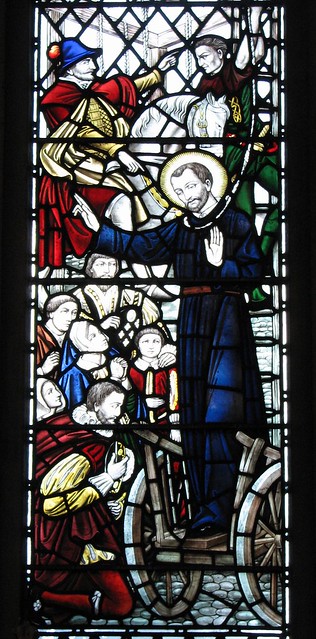A blog of the Ordinariate Groups found in Devon and Cornwall: Torbay, St Austell and Buckfast.
Saturday 10 November 2012
Monday 5 November 2012
The commandment to Love
The Commandment to Love
Throughout the history of the Old Testament, Israel was able to discover that God only had one reason to reveal Himself to them. They discovered only one motive for God to choose them from among the peoples as His special people. And that reason, and that motive, was sheer, gratuitous love.
It was out of love that God never stopped saving them and pardoning their unfaithfulness and sins. Ultimately it is the reason for His greatest gift: “God so loved the world that he gave his only Son.”
This is of course our perspective with hindsight, it wasn't necessarily the perspective of all Jews at the time of our Lord. When therefore a scribe asks a question of Jesus and asks what is the first commandment, and Jesus gives the commandment to love, it wasn't necessarily an answer that everyone would have agreed with. So Jesus commends the Scribe for recognising this fundamental reality. While every Jew no doubt recognised the necessity of loving God with all one's heart and soul and strength; not everyone would have understood that this also implies love of all human beings. And even the suggestion that we should love our neighbour, could have meant to only love fellow Jews. For Christ however it is clear that the love of neighbour means, the love of everyone, even our enemies.
St John, in his epistle, goes even further, when he says that God is love. God's very being is love. In time the Church would say that God is an eternal exchange of love between Father, Son and Holy Spirit, calling this Trinity. God's very being is not solitary, is not aloneness – God's being is trinitarian, a perfect interchange of three Persons in perfect relation, in perfect love.
Some might say that this is all very fine, what a nice image of God, but does it make any difference? It could all remain theoretical, unless we also acknowledge that human beings are made in the image and likeness of God. This is a fundamental principle for Jews and Christians. What we believe about God has a direct effect on the way we understand human beings and how we behave towards one another. Being made in the image and likeness of God, and God being an eternal interchange of love, means that for human beings our destiny is an eternal interchange of love. We are made out of love, we are made for love, to be loved, to give love, to find meaning in love and to worship our God who is perfect love, and walk the path that leads to eternal love.
So the commandments are summed up in two of the commandments from the Law of Moses, but both are bound up together: the love of God and the love of neighbour. Unless we love God with all our heart, soul and strength, that is with our whole being, we will not know who God is. For God can only be approached by love. We do not grow closer to God by walking. We grow closer to God, and know God, through love. And we cannot truly say we love God, if we do not love our neighbour, love all those who are made in the image of God. The two are bound up together.
Love, then is the very heart or core of our Faith. St Paul tells us that of the gifts of the Holy Spirit, the greatest is love. The three virtues Faith, Hope and Love are the three crucial things we must grow in to make us fit for Heaven, but the greatest, as St Paul says, is Love.
Finally we have to of course remember that love is not just sentiment – Jesus said, “Greater love hath no man than this, that he give up his life for his friends.” We are called to give up our lives for love, out of love, in love for this is the nature of the Trinity – each Person gives all for the sake of the other. God empties Himself to be born in human flesh. And we are called to do the same. Our Lady, the first disciple, emptied herself in order to respond in love – Be it unto me according to thy will. And likewise are we called to empty ourselves for love. Amen.
Subscribe to:
Posts (Atom)
-
An Examination of Conscience for Lent reflecting on Christ’s Suffering and Passion on the Cross by Fr Dylan James “The Cross ex...
-
Reflections on the theme of Worship through reflecting on the sacrifices of the Old Testament: Introduction Sacrifice of Abel Sacrifice of ...
-
The offerings of Cain and Abel to God, in Genesis 4, come as one of the first acts the children of Adam and Eve perform. They make a sacri...
